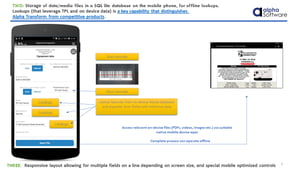 5 reasons you need a mobile application development platform.
5 reasons you need a mobile application development platform.
Enterprises have a tough time keeping up with the demand for writing mobile apps. One of the best pieces of evidence of that is a Gartner report, “Survey Analysis: The Mobile App Development Trends That Will Impact Your Enterprise in 2017,” which found that “More than a quarter of enterprises globally have not built, customized or virtualized any mobile apps in the last 12 months.” The conclusion: enterprises need to make a move to get a mobile application development platform if they don't already have one.
The solution is at hand: Mobile application development platforms (MADPs), or rapid mobile application development (RMAD) platforms, the difference being that RMAD platforms use a low-code or no-code approach to writing mobile apps. Robert Sheldon, in his blog post for SearchMobileComputing, “The business case for mobile app development platforms,” offers great insights into the benefits offered by these platforms. Following are highlights of his five business cases for them.
They ensure more apps are deployed to more OS platforms more quickly
MADPs and RMAD platforms provide tools for deploying apps to multiple mobile platforms and device types, not just a single one. That include smartphones, tablets and wearables. MADPs and RMAD platforms let developers build a single code base that they can deploy easily to all the platforms and devices, dramatically speeding time to deployment. RMADs have the additional benefit of making it easy to write the apps, by “bringing modular, drag-and-drop capabilities to the development environment so admins can create apps faster and easier,” in Sheldon’s words.
They reduce development and implementation costs
The platforms, Sheldon says, cut development costs “by providing a cross-platform framework that supports code reuse, modular development and team collaboration, while offering development templates, plug-ins and prebuilt components for streamlining operations.” They also reduce training time for developers, and cut time-related development costs because they support the entire app lifecycle, starting with building apps and ending with hosting them.
They free up DevOps for higher-priority projects
Because teams need to spend far less time and effort on deploying mobile apps, they can be freed up for higher-value tasks. He notes: “Most organizations have a wide range of development projects they want DevOps to implement. If teams get bogged down building and deploying mobile apps, they'll have little time left for anything else.”
They enable internal stakeholders to build their own apps
This benefit is offered by RMADs platforms. Sheldon points out that “RMAD makes possible the citizen developer, a power user, such as a financial analyst or operations expert, who can build apps without relying on DevOps resources.” Both smaller organizations and larger enterprises get this benefit, by deliver apps faster and less expensively. And they can build surprisingly sophisticated mobile apps, given the power in many RMAD platforms.
They simplify integration with back-end systems, services and data access points
It’s vital that backend technologies get incorporated into mobile apps. But doing this manually is often an extremely time-consuming, expensive and never-ending task. But sheldon notes that “MADP tools can do much of the integration work for organizations by including the middleware and back-end services necessary to manage data and facilitate connectivity with other services and data points. They provide prebuilt connectors and proven APIs based on industry standards, allowing workers to secure and manage apps, while providing them with access to the necessary data.”
Alpha Anywhere is one of the most highly rated RMAD low-code platforms. InfoWorld named it a top mobile app development leader, and users continually rate it tops on product review sites. Here are details about Alpha Anywhere’s low-code capabilities.







Comment